Search and filter
Publications: 529
-

Americas Strategy 2022–2025
This report, which was approved by the Federal Council on 16 February 2021, is a geographical follow-up strategy to the Foreign Policy Strategy 2020–23 (FPS 20–23). The approval of the Americas Strategy 2022–25 is one of the measures taken by the Federal Council in meeting its annual objectives for 2021.
-

Swiss neutrality
With this joint brochure of the FDFA and the DDPS, we set out what Switzerland’s neutrality means and how it is implemented. Swiss neutrality no longer needs to be invented, but understanding its importance and role is important for our country, today and in the future.
-

Swiss Peace Supporter 1/2022
This issue highlights the 'return on investment' of peace operations, i.e. their personal and institutional added value. An assignment at the UN in New York, for example, gave a colleague important impulses for his work in Sri Lanka. Other topics include the conflict in Cameroon in the context of the Africa Cup, a Moscow exhibition on gulags, and a look back at a long FDFA career in peacebuilding.
-

Guidelines on Water 2022-25
The Guidelines on Water 2022–2025 substantiate the principles of the Foreign Policy Strategy 2020−23 and the IC Strategy 2021−24 in relation to the foreign policy thematic priority of water. The structure is framed by the five key objectives of the 2030 Agenda for Sustainable Development: people, planet, prosperity, peace and partnership. The guidelines are part of the third level of the cascade of core foreign policy documents. They are primarily aimed at the FDFA but may also provide guidance for other departments and actors. A glossary explains the key terms.
-

Swiss cooperation programme Kosovo 2022-2025
Starting with humanitarian assistance in 1998, Switzerland’s cooperation with Kosovo has gradually shifted towards supporting transition processes and progress towards European standards and values. In 2008, Switzerland was one of the first countries to recognize the republic of Kosovo and to establish diplomatic and consular relations. Switzerland and Kosovo have since then developed a trusted partnership based on mutual interests and rooted in the spirit of the cooperation agreements between the two governments.
-

Arms Control and Disarmament Strategy 2022–2025
This report, which was approved by the Federal Council on 2 February 2022, is a thematic strategy following up on the Foreign Policy Strategy 2020−23 (FPS 2020−23). The adoption of an Arms Control and Disarmament Strategy is a measure that the Federal Council has undertaken as part of its annual objectives for 2021. This Federal Council report also fulfils postulate 21.3012 of the National Council’s Security Policy Committee.
-

Un seul monde 1/2022
Climate change threatens to slow down or even reverse progress in global poverty reduction. International cooperation is responding – together with the local populations.
-

OSCE Action Plan 2022–2025
The Federal Department of Foreign Affairs (FDFA) sees the 50th anniversary of the Helsinki Final Act in 2025 as an opportunity to take stock and look forward with a positive agenda. Through its 2022–25 action plan for the OSCE, Switzerland seeks to identify measures which will help strengthen the organisation and rebuild European security. The action plan does not aim to cover Switzerland's entire policy within the OSCE; instead, it highlights those areas in which Switzerland can make a significant contribution by 2025.
-

Swiss cooperation programme North Macedonia 2021-2024
Switzerland has been supporting North Macedonia’s political, social and economic transition since 1992. Today, it ranks among North Macedonia’s largest bilateral cooperation partners.
-

Swiss cooperation programme Mekong Region 2022-2025
-

Kooperationsprogramm Ausstiegsprogramm Kuba 2022-2024
Das vorliegende Kooperationsprogramm 2022–2024 plant den Ausstieg der langjährigen bilateralen Entwicklungszusammenarbeit der DEZA aus Kuba. Dies ist gemäss dem Entscheid des schweizerischen Parlaments von 2020, die bilateralen Mittel für Lateinamerika bis 2024 schrittweise auf die Regionen Nordafrika, Mittlerer Osten und Subsahara-Afrika zu verlagern.
-

Equal opportunities in the workplace: FDFA Action Plan 2028
The FDFA Action Plan 2028 on Equal Opportunities in the workplace is based on the findings of the evaluation of the Equal Opportunities Policy 2010-2020. It comprises four fields of action with measurable goals and concrete measures for the period 2022-2028. It aims to create a common understanding in order to improve equal opportunities, diversity and inclusion within the FDFA.
Publications and Services
Last update 25.10.2023
Contact
FDFA Communication



